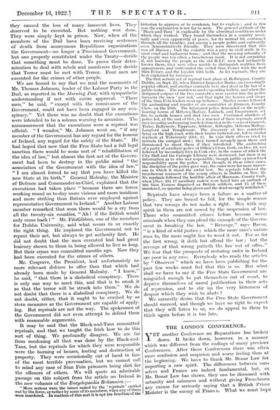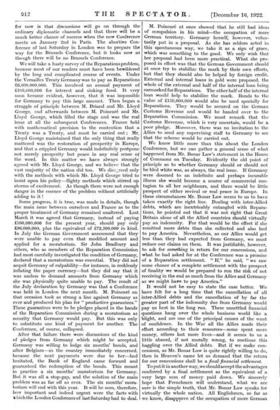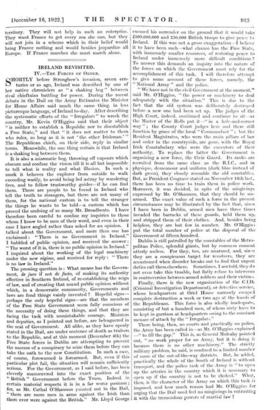THE LONDON CONFERENCE.
YET another Conference on Reparations has broken down. It broke down, however, in a manner which was different from the endings of many previous Conferences. After those Conferences there was often more confusion and suspicion and worse feeling than at the beginning. We have to thank Mr. Bonar Law for importing a new spirit. The differences between ours selves and France are indeed fundamental, but, as Mr. Bonar Law has shown, they can be discussed with urbanity and calmness and without giving Frenchmen any excuse for seriously saying that a British Prime .Minister is the enemy of France. What we must hope for now is that discussions will go on through the ordinary diplomatic channels and that there will be a much better chance of success when the new Conference meets on January 2nd in Paris. The abortive Con- ference of last Saturday in London was to prepare the way for the Brussels Conference, but it looks now as though there will be no Brussels Conference.
We will take a hasty survey of the Reparations problem, because most of our readers must have been bewildered by the long and complicated course of events. Under the Versailles Treaty Germany was to pay as Reparations £6,600,000,000. This involved an annual payment of £100,000,000 for interest and sinking fund. It very soon became evident, however, that it was impossible for Germany to pay this large amount. Then began a struggle of principle between M. Briand and Mr. Lloyd George, and afterwards between M. Poineare and Mr. Lloyd George, which filled the stage and was the real issue at all the subsequent Conferences. France held with mathematical precision to the contention that a Treaty was a Treaty, and must be carried out ; Mr. Lloyd George maintained that the only thing that really mattered was the restoration of prosperity in Europe, and that a crippled Germany would indefinitely postpone not merely prosperity but peace in any real sense of the word. In this matter we have always strongly agreed with Mr. Lloyd George, and we believe that the vast majority of the nation did too. We disaL;reed only with the methods with which Mr. Lloyd George tried to insist upon his policy—flighty methods which stirred up storms of excitement. As though there were not enough danger in the essence of the problem without artificially adding to it !
Some progress, it is true, was made in details, though the main issue between ourselves and France as to the proper treatment of Germany remained unaltered. Last March it was agreed that Germany, instead of paying £100,000,000 for the present year, should pay only E36,000,000, plus the equivalent of £72,500,000 in kind. In July the German Government announced that they were unable to pay even that modified amount and applied for a moratorium. Sir John Bradbury and others, who as members of the Reparation Commission had most carefully investigated the condition of Germany, declared that a moratorium was essential. They did not acquit Germany of culpability—for instance, in recklessly inflating the paper currency—but they did say that it was useless to demand amounts from Germany which she was physically quite unable to pay. The result of the July declaration by Germany was that a Conference was held in London the next month. M. Poineare on that occasion took as strong a line against Germany as ever and produced his plan for "productive guarantees." These guarantees were to be pledges placed in the hands of the Reparation Commission during a moratorium as security that Germany would pay. But this was only to substitute one kind of payment for another. The Conference, of course, collapsed.
After that failure there were discussions of the kind of pledges from Germany which might be accepted. Germany was willing to lodge six months' bonds, and after Belgium—as the country immediately concerned, because the next payments were due to her—had hesitated, the Bank of England came forward and guaranteed the redemption of the bonds. This meant in practice a six months' moratorium for Germany. But it was all a stop-gap, and the solution of the main problem was as far off as ever. The six months' mora- torium will end with this year. It will be seen, therefore, how important and indeed urgent were the facts with 'which the London Conference of last Saturday had to deal. M. Poincare at once showed that he still had ideas of compulsion in his mind—the occupation of more German territory. Germany herself, however, volun- tarily put in a proposal. As she has seldom acted in this spontaneous way, we take it as a sign of grace, which was something to the good. We only wish that her proposal had been more practical. What she pro- posed in effect was that the German Government should at once try to stabilize the mark by their own efforts, but that they- should also be helped by foreign credit. External and internal loans in gold were proposed, the whole of the external and half of the internal loan being earmarked for Reparations. The other half of the internal loan would help to stabilize the mark. Bonds to the value of £150,000,000 would also be used specially for Reparations. They would be secured on the German Customs Revenue and would be handed over to the Reparation Commission. We must remark that the Customs Revenue, which is very uncertain, would be a poor pledge. Moreover, there was no invitation to the Allies to send any supervising staff to Germany to see that the scheme would be carried out.
We know little more than this about the London Conference, but we can gather a general sense of what happened from Mr. Bonar Law's statement in the House of Commons on Tuesday. Evidently the old point of principle as to whether Germany should or should not be bled white was, as always, the real issue. If Germany were doomed to an indefinite and perhaps incurable illness she would become a source of commercial con- tagion to all her neighbours, and there would be little prospect of either revival or real peace in Europe. In these circumstances Mr. Bonar Law seems to us to have taken exactly- the right line. Dealing with inter-Allied debts, which are inextricably entangled with Repara- tions, he pointed out that it was not right that Great Britain alone of all the Allied countries should virtually pay an indemnity. For that would be the effect if she remitted more debts than she collected and also had to pay America. Nevertheless, as our Allies would get less than they had expected from Germany, we must reduce our claims on them. It was justifiable, however, to ask for something in return for our concessions, and what he had asked for at the Conference was a promise of a Reparation settlement. "If" he said, "we saw some chance of a complete settlement with the prospect of finality we would be prepared to run the risk of not receiving hi the end as much from the Allies and Germany as we might have to pay America."
It would not be easy to state the case better. We have felt for a long time that the cancellation of all inter-Allied debts and the cancellation of by far the greater part of the indemnity due from Germany would pay us best in the long run. These unsettled financial questions hang over the whole business world like a blight, and are one of the principal causes of the want of confidence. In the War all the Allies made their effort according to their resources—some spent more money, others lost more lives—and it seems to us a little absurd, • if not morally wrong, to continue this haggling over the Allied debts. But if we make con- cessions, as Mr. Bonar Law is quite rightly willing to do, then in Heaven's name let us demand that the return for our concessions shall be a final financial settlement.
To put it in another way, we should accept the advantages conferred by a final settlement as the equivalent of a very large sum of money paid down. We sincerely hope that Frenchmen will understand, what we are sure is the simple truth, that Mr. Bonar Law speaks for virtually the whole nation. All Englishmen, so far as we know, disapprove of the occupation of more German territory. They will not help in such an enterprise. They want France to get every sou she can, but they will not join in a scheme which in their belief would bring France nothing and would besides jeopardize all Europe. If France marches she must march alone.
















































 Previous page
Previous page